Tell us about your approach to photography. How it all started? What are your memories of your first shots?
Krzysztof Sienkiewicz (KS): I think my passion for photography emerged in high school, when I had a chance to attend photography classes with two brilliant photographers, who actually shaped my way of thinking about this media.
About your photographic work now. How would you describe your personal research in general?
KS: Everything I have ever done focuses on urban landscape or the city in general. I was born and raised in Warsaw, so naturally this city became my very first inspiration and a subject to investigate as well. I believe that our surrounding may often tell us much more about ourselves than our appearance. Therefore in my personal work I try to analyze what we, humans, build or leave behind – shortly speaking, how we construct our surrounding. Moreover, I like to take pictures alone, observing what is going on around me for long minutes. This, to be honest, makes me a rather poor portrait photographer. Maybe this is also one of the reasons I focus on human in an indirect way.
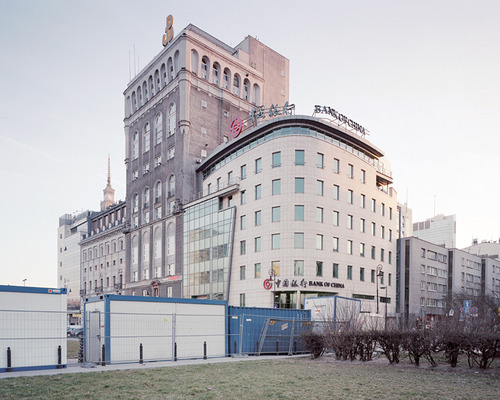
© Krzysztof Sienkiewicz, Warszawa, from the series ‘Urban Collage’
Do you have any preferences in terms of cameras and format?
KS: I take photos almost exclusively on negative films, both medium and large format. I take pictures rather rarely and after a long consideration, so I’m more or less able to afford this manner. Yet I’m currently considering buying a digital camera because of the cost of negatives.
Your project 'Urban Collage’ is an investigation into the Polish urban landscape. On the transformation of its face. It highlights conflicting aspects in the transition to a Poland fully integrated into the modern European context. How do you see this process?
KS: I was born right after the communist era, so what I know about those times is what I’ve been told, what I’ve read and… what I have seen. To me Polish urban landscape is full of signs marking the events and issues of the last century and the recent years as well (the devastation during the World War II, social realism in architecture, current capitalism and shortsightedness in urban planning). That is why I chose to investigate our surrounding as a pretext for a deeper analysis of how Polish society has changed throughout that time. Moreover, for the last couple of years I was looking for an appropriate approach to describe Warsaw and the general concept of a “Polish big city”. Sometimes I think this might be it.
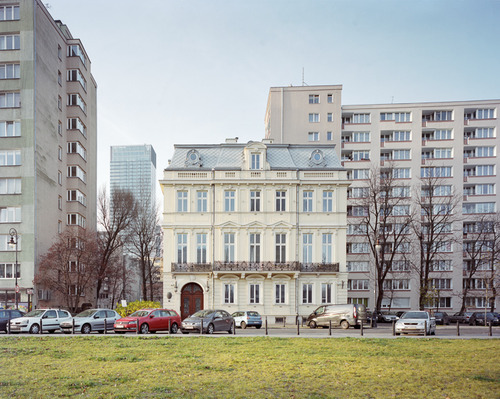
© Krzysztof Sienkiewicz, Warszawa, from the series 'Urban Collage’
In the series 'Backstage’, you focus on the 'non-places’, and you quote the anthropologist Augé. You recall the impersonal dimension of the built space of many cities. More generally the series evokes a role of photography as a means to offer a different perspective on reality. Can you comment on this?
KS: Photography is a lie. By that I do not mean to depreciate its importance or the ability to describe our surrounding, emotions or important social processes. I want to highlight that photography is all about making choices and, at the end of the day, presenting just a tiny fragment of the subject we were working on. Therefore whatever we do with this media, we always present a particular perspective of the reality: not only our own, but also the one shaped by the very mechanism of creating photographic works and projects. For me this is extremely inspiring, especially in the case of documentary photography. In my Backstage project I wanted to focus exactly on a very small aspect of these non-places: their form, colour, their appearance.
Is there any contemporary artist or photographer, even if young and emerging, that influenced you in some way?
Yes, definitely. I’m very much inspired by the works of Mark Power, Bas Princen, who is a magician to me, not a photographer, and, to some extent, Stephen Shore.
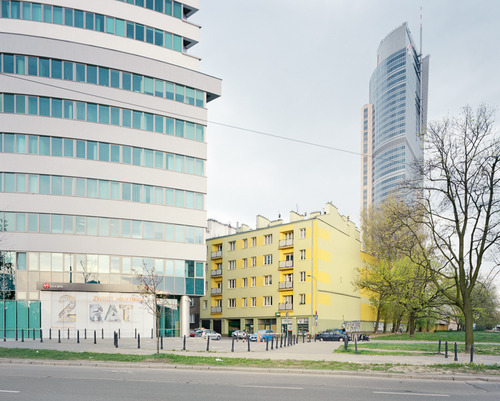
© Krzysztof Sienkiewicz, Warszawa, from the series 'Urban Collage’
Three books about photography which you would recommend?
KS: Melody of Two Songs by Mark Power, Pastoral by Alexander Gronsky and almost anything by Bas Princen.
Is there any show you’ve seen recently that you find inspiring?
KS: I had a chance to see Constructing Worlds exhibition at the Barbican Art Gallery in London recently. The moment I saw (and experienced!) Hiroshi Sugimoto’s architecture photographs on a wall will remain in my memory for years.
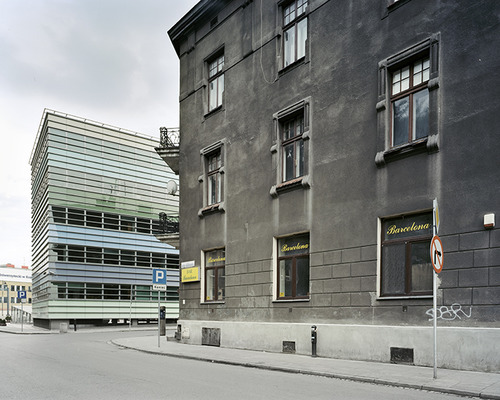
© Krzysztof Sienkiewicz, Kraków, from the series 'Urban Collage’
Projects that you are working or plans for the future?
KS: My plan for 2015 is to close my investigation on Warsaw as a part of the “Urban Collage” project and focus on other big cities of Poland, but it all depends on funds. I would also like to sit down with books and do the historical/urban analysis of the places I took pictures of.
Let’s talk about the Polish photography scene. What’s your general opinion?
KS: In my opinion Polish photography scene is extremely interesting for two reasons: it is developing very fast with lots of promising, emerging photographers and, on the other hand, we have a large body of work from twentieth century yet to be analyzed. I believe many of Polish photographers, apart from those who already do (like, for instance, the photo-collective Sputnik Photos), demand wider recognition.
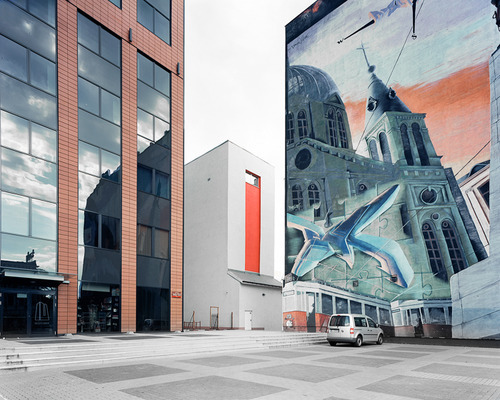
© Krzysztof Sienkiewicz, Łódź, from the series 'Urban Collage’
What are the Polish photographers or the projects that you have recently liked?
KS: Just to point out a few: I’m very happy to see that Łukasz Biederman is working on his nocturnes again. I also like Wiktoria Wojciechowska’s work in general and Tomasz Łaptaszyński’s project entitled Antiquity Now.
Why did you choose to collaborate with Urbanautica? And how will you help us to better approach and understand the Polish photography scene?
KS: The very first reason is that I simply really admire what Urbanautica does and what kind of photography is presented on its pages. To have an opportunity to participate in this project is very important to me. I am a young Polish photographer myself, so I believe I do have an insight into what is happening on the Polish photographic scene and hopefully will be able to present that via Urbanautica.
---
LINKS
Krzysztof Sienkiewicz
Poland
share this page